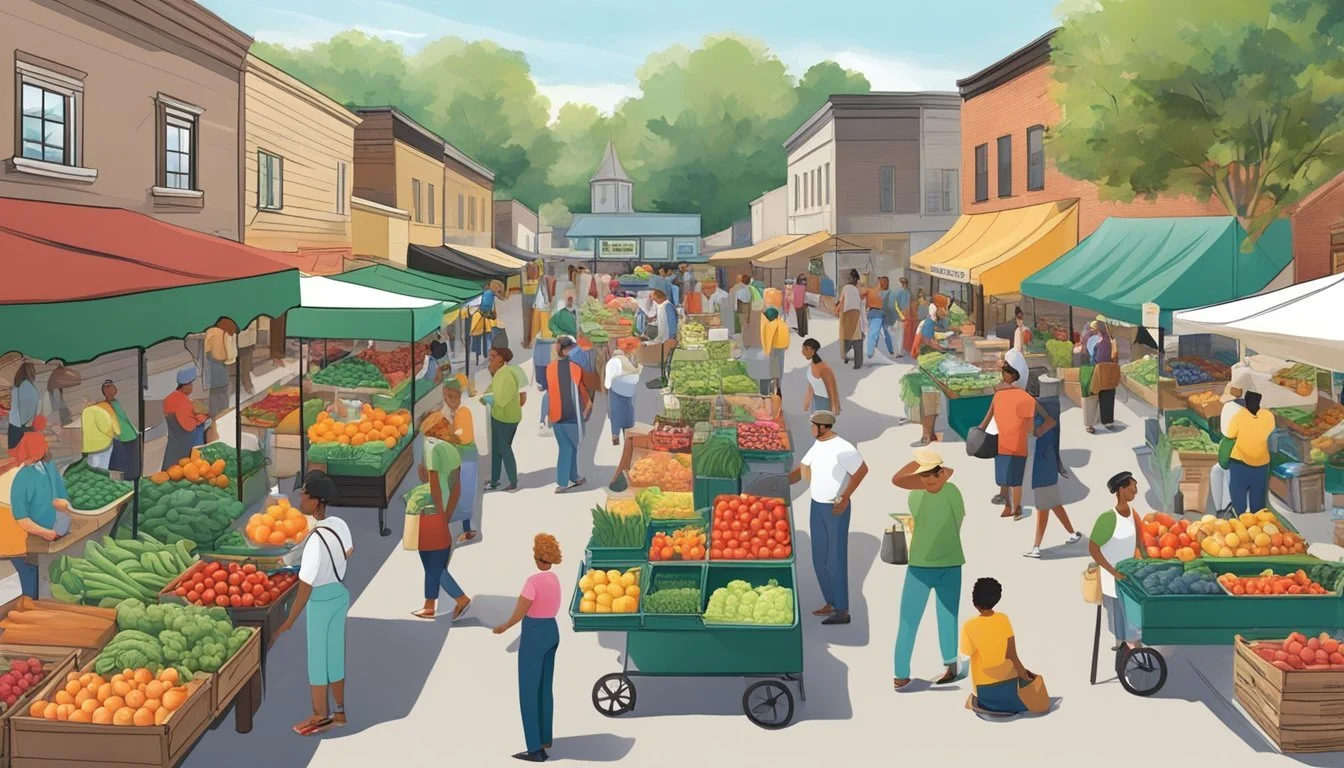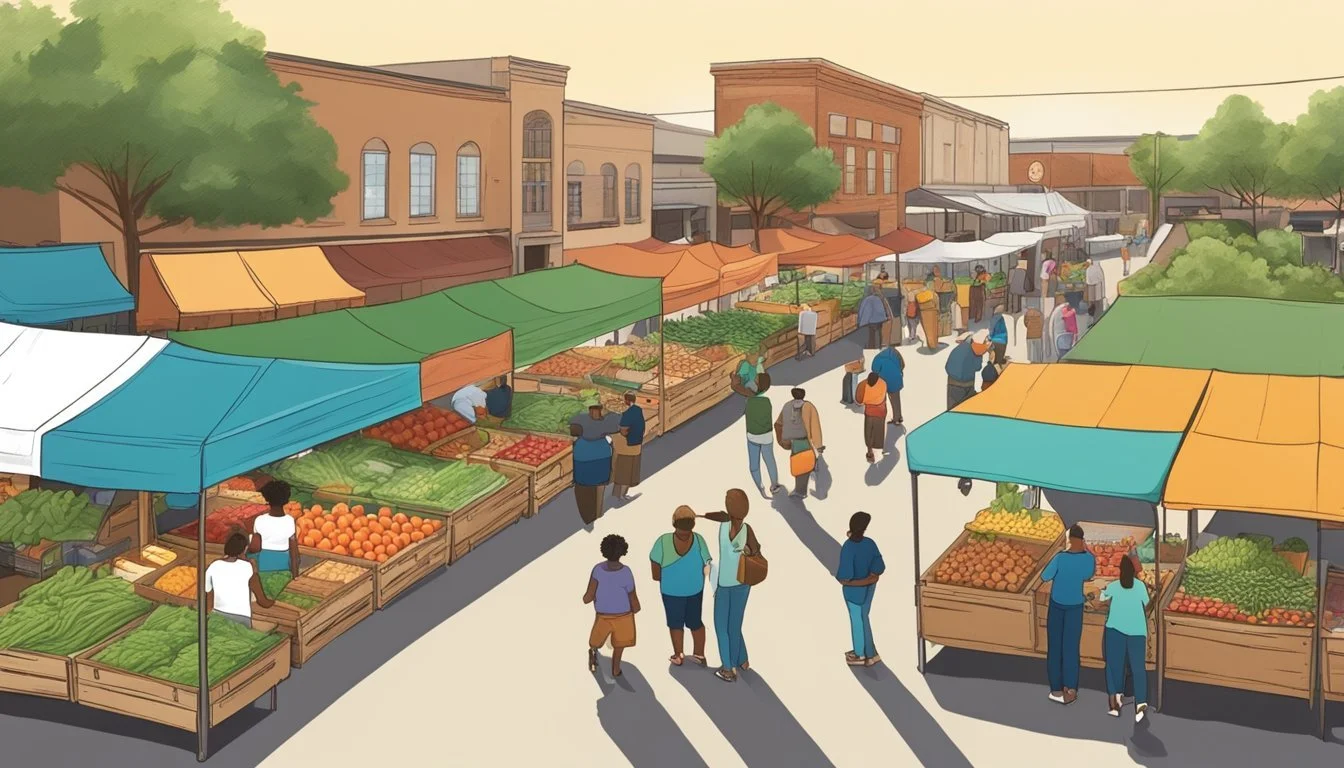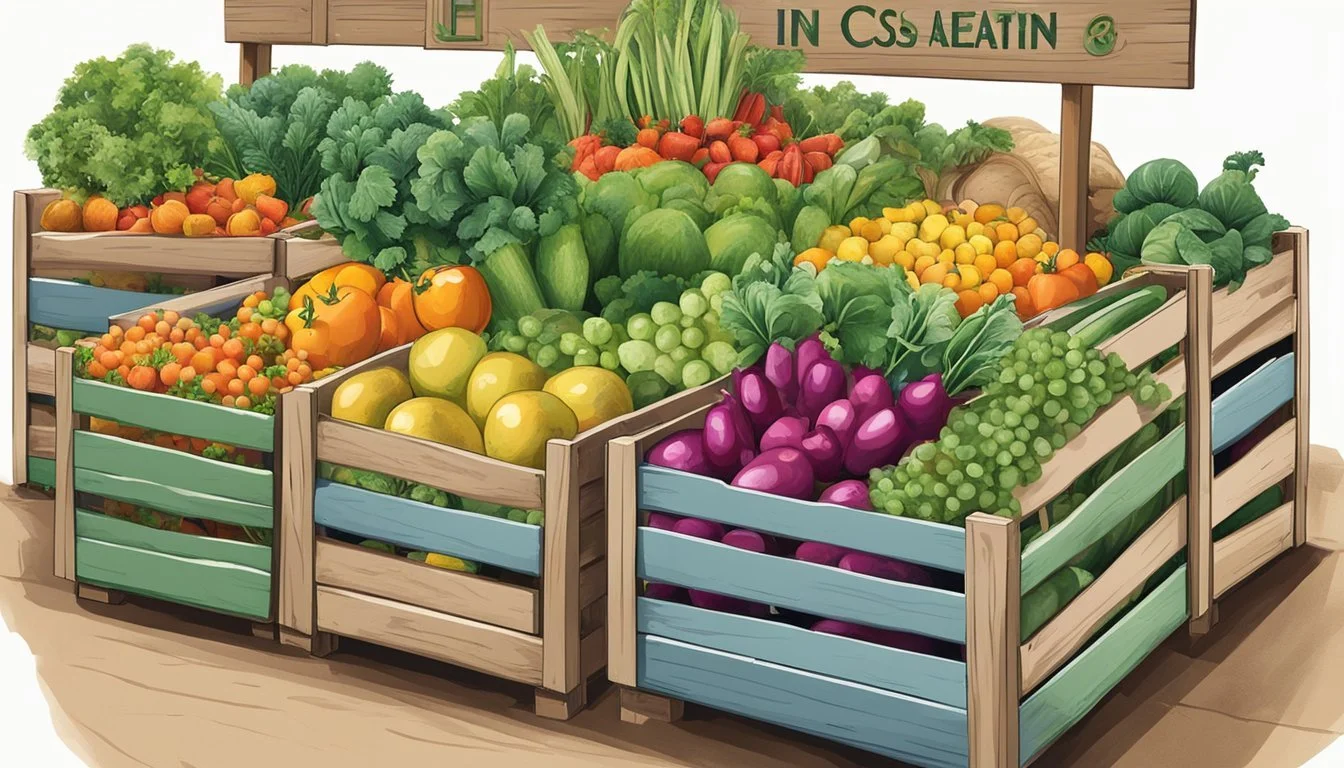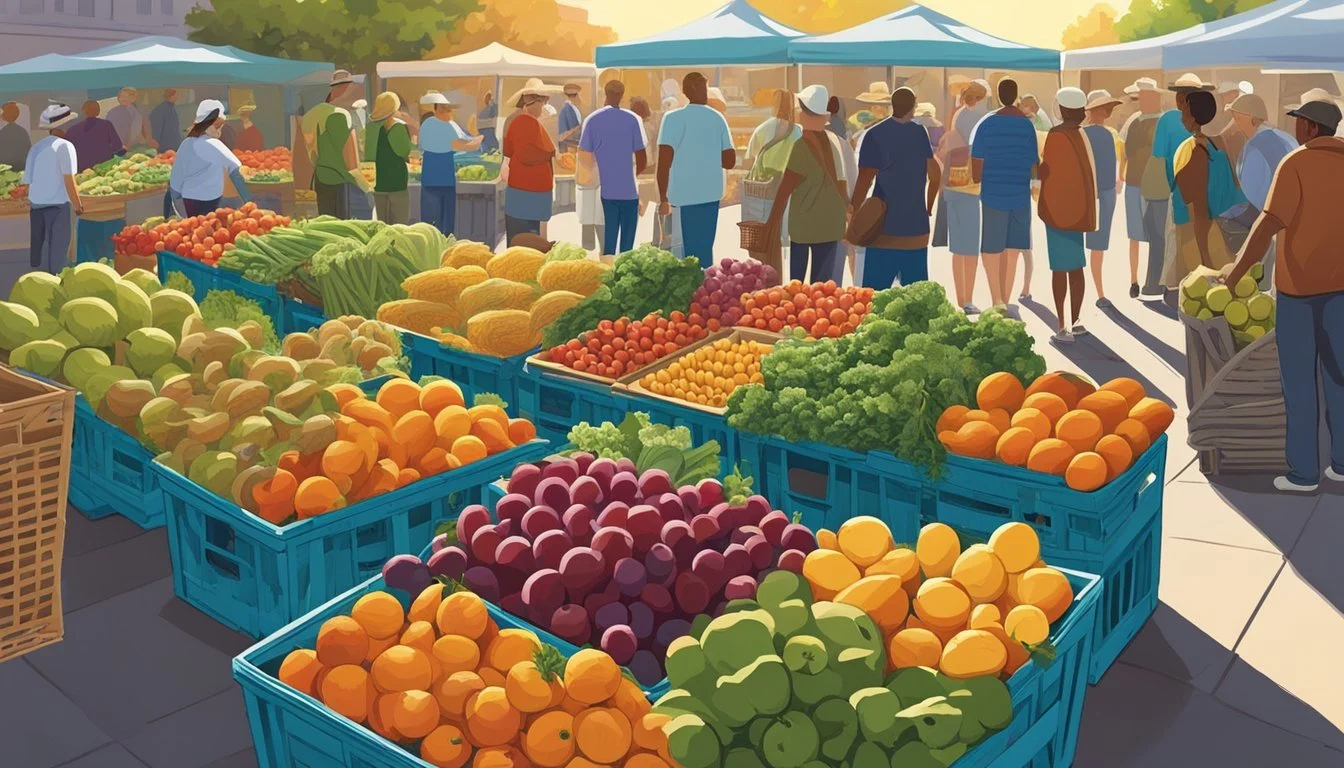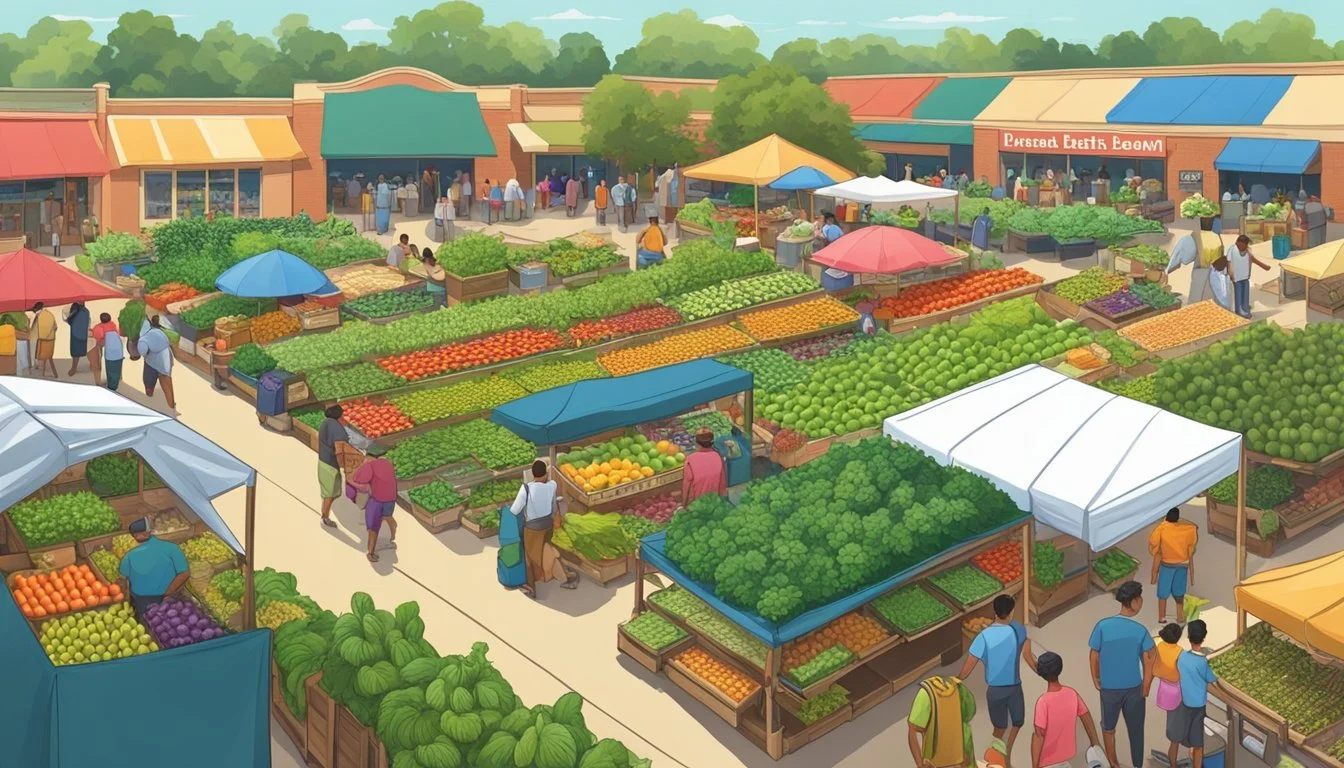Community Supported Agriculture (CSA) in Beaumont, TX
A Guide to Local Farm Shares
Community Supported Agriculture, more commonly known as CSA, represents a model of food production and distribution that has gained prominence in Beaumont, TX, as well as across the nation. At its core, CSA functions on a subscription-based system where consumers purchase 'shares' from local farms. This not only ensures a steady supply of fresh, seasonal produce but also strengthens the financial stability for farmers. By committing to local CSAs, residents of Beaumont have the unique opportunity to revel in the bounty of their regional farmlands, forging a closer connection between the food on their plates and the soil where it's cultivated.
The CSA model in the Beaumont area offers a symbiotic relationship between farmers and consumers. Participants typically receive a weekly or bi-weekly box of vegetables and, in some cases, additional farm products may be included. This approach to agriculture underscores a commitment to community engagement and support for local farmers. It fosters an appreciation for the region's agricultural heritage while embracing a more sustainable and environmentally conscious method of food consumption.
In Beaumont, access to high-quality, farm-fresh products through CSAs underscores the area's dedication to maintaining a robust link with local agriculture. While the number of participating farms within the immediate vicinity might be few, those within the broader Texas region contribute to a network that prioritizes quality and freshness. As consumers increasingly seek comprehensive, authoritative content on their food sources, the CSA framework in Beaumont not only delivers on these demands but also enhances the overall food experience with the benefits of local sourcing.
Understanding CSA
Community Supported Agriculture (CSA) has become a significant part of sustainable agriculture, promoting a strong relationship between local farms and community members. It directly supports organic farming practices and bolsters the community farm model.
History of the CSA Movement
The CSA movement has its origins in Europe and Japan in the 1960s, introduced to the United States in the 1980s by a Swiss farmer. The U.S. saw its early CSA models with Temple-Wilton Community Farm and Indian Line Farm, both established in 1986. These pioneers laid the groundwork for a system that now provides a robust alternative to conventional food distribution channels.
Principles of CSA
At its core, the CSA model is built on several key principles:
Community Engagement: CSA encourages a symbiotic relationship between the community and the farm.
Shared Risks and Rewards: Members purchase shares of the harvest in advance, aligning themselves with the fortunes of the farming season.
Sustainable and Organic Practices: Many CSA farms employ methods that support sustainable agriculture, often aligning with organic farming standards set by the U.S. Department of Agriculture.
CSA Memberships
CSA memberships involve community members subscribing to the yield of their local farms, where they typically:
Commit Financially: Members pay upfront for a season’s worth of produce, sharing in the inherent risks and benefits of agricultural production.
Receive Regular Distributions: Shareholders routinely receive a portion of fresh produce throughout the farming season.
Foster Farm-to-Community Connection: The direct relationship reinforces the bond and understanding between the producer and the consumer.
CSA in Beaumont, TX, adheres to these guiding principles, creating a unifying force that ties the practice of agriculture closely with the community’s daily life and diet.
Benefits of Joining a CSA
Joining a Community Supported Agriculture (CSA) program provides a myriad of advantages. Consumers gain access to fresh and nutritious produce, while farmers receive direct financial support. Moreover, the local community benefits from a strengthened sense of unity and reduced environmental impact.
For Consumers
Consumers enjoy a weekly supply of fresh produce that is often richer in nutrients due to lower time in transit compared to store-bought items. Participating in a CSA also introduces them to a diverse range of seasonal produce, some of which they may not encounter at a typical grocery store. This practice encourages a nutritious and varied diet while fostering a habit to eat local.
Direct benefits for consumers include:
Access to fresh, seasonal, and nutritious produce
Exposure to a diverse array of produce varieties
Deepened understanding of local agriculture
For Farmers
Farmers benefit from financial support upfront, which aids in planning and managing farm resources more efficiently. The direct partnership with consumers also allows for more stability and can lead to a more sustainable income stream. Being part of a CSA, local farmers are supported which in turn helps preserve local agriculture traditions and practices.
Direct benefits for farmers include:
Streamlined revenue and reduced marketing costs
Enhanced capacity for farm planning and resource allocation
Building of a loyal customer base committed to supporting local farms
For the Community
The CSA model fosters a sense of community by connecting members directly with the source of their food. It encourages the community to actively participate in supporting local farmers, which in turn can have a positive environmental impact—reducing food miles and associated carbon footprint. Additionally, it stimulates the local economy and promotes a community-centric approach to food consumption.
Direct benefits for the community include:
Strengthened local economy through support of local agriculture
Environmental benefits from reduced transportation emissions
Enhanced sense of community through shared support for local farmers
How CSAs Work in Beaumont, TX
Community Supported Agriculture in Beaumont operates on a foundational structure where local farms offer produce subscriptions to community members. These subscriptions translate into a seasonal selection of fresh vegetables, fruits, and other farm products.
Seasonal Subscription
CSAs in Beaumont function on a seasonal subscription basis. Members purchase shares at the beginning of a growing season, which entitle them to a portion of the farm's harvest throughout that period. Subscriptions may vary by length but typically align with the spring, summer, or fall harvests.
Types of Products Offered
Beaumont CSAs provide a diverse range of products. Subscriptions commonly include:
Vegetables: A variety of seasonal vegetables straight from local fields.
Fruit: Fresh fruit selections when in season.
Eggs, Meat, and Cheese: Animal products offered by some farms.
Flowers: Available from farms that cultivate blooms alongside produce.
Members often have the choice of standard or customizable shares depending on the CSA they subscribe to.
Delivery and Pick-Up Options
CSAs in Beaumont offer different methods for receiving the farm products:
Pick-Up: Members can collect their shares at predetermined locations on specific days.
Delivery: Some CSAs provide delivery options, bringing fresh produce directly to the member's doorstep for convenience.
Selecting the Right CSA for You
In Beaumont, TX, residents can choose from several Community Supported Agriculture (CSA) programs that connect them directly to local farms, offering access to fresh, seasonal produce. When selecting a CSA, it's important to consider the types of products offered, share sizes, costs, and the level of commitment involved.
Evaluating CSA Options
Residents should begin by researching local farms that offer CSA shares. It's beneficial to visit farmers markets to meet potential CSAs firsthand and inquire about their farming practices. Transparency is key, and farms should willingly share information regarding their growing methods and crop varieties. Additionally, potential customers may look into whether the CSA has flexible share options or additional products like eggs or dairy. A list of factors to consider includes:
Location: The proximity of pickup locations.
Variety: The diversity of crops offered.
Farming Practices: Organic, conventional, or biodynamic methods.
Sales and Payment Plans: Pre-season payment or installment plans.
Understanding Share Sizes and Costs
CSAs typically offer different share sizes that may affect the value perceived by the customer. Share sizes can range from small, suitable for individuals, to large, meant for families. Costs will vary based on the size and offerings. A customer looking for simplicity may prefer a single, standard size, while another may opt for a CSA that allows for customization. To aid in decision-making, consider the following:
Small Shares: Ideal for 1-2 people, usually less cost-effective but require less storage.
Large Shares: Best for families or those who cook often, offering greater value but necessitating more storage space.
The Commitment to a CSA
Committing to a CSA means entering a season-long relationship where the customer should be prepared for the ebb and flow of farming. The customer shares in both the bounty and the risks, such as weather impacts or crop failures. Payment is typically required upfront, which provides the farms with necessary capital at the start of the growing season. Customers should understand this commitment and be ready to support their chosen CSA through various challenges, enjoying the rewards of fresh, local produce while fostering a deeper connection with their food source.
Challenges and Considerations
Community Supported Agriculture (CSA) in Beaumont, TX, involves unique challenges and critical considerations that affect both farmers and members. Key aspects include managing the inherent risks of agriculture, structuring payments to benefit all parties, and ensuring sufficient member involvement for a thriving CSA.
Weather and Crop Risks
In Beaumont, TX, CSA programs must contend with the region's unpredictable weather, from droughts to floods, which can significantly impact crop yields.
Droughts: Limited water availability can lead to a scarcity of irrigation, affecting the growth of seasonal produce.
Floods: Excessive rain can damage crops and lead to soil erosion.
Both scenarios present significant risks to a farm's output and income, potentially leading to reduced or altered distributions to members.
Payment Structures
The payment model within a CSA is pivotal for its sustainability.
Advance Payment: Members usually pay at the start of the season. This initial income is crucial for the farm's early operational costs.
Cash Flow Challenges: Farmers need to carefully balance cash flow due to the lump-sum nature of CSA payments.
These structures require farmers to plan extensively and members to commit financially, contributing to the farm's stability but also linking their economic wellbeing to the farm's success.
Member Involvement
Member commitment in a CSA is a double-edged sword.
Work Shares: Some CSAs offer a reduction in cost for members who contribute labor, potentially increasing member commitment and reducing labor expenses for the farm.
Expectation Management: Clear communication is vital to ensure members understand the nature of their CSA commitments and the potential variability in the size and type of produce they receive.
Effective member involvement is crucial for community building and can help address the unpredictability of farming by sharing the risks and rewards among the community.
CSA Resources in Beaumont, TX
In Beaumont, Texas, residents have several avenues to access locally-sourced, fresh produce through various CSA programs. These programs not only provide fresh food but also create opportunities for education and community engagement.
Local CSA Listings
Beaumont's community can benefit from CSA subscriptions that connect them with local family farms and ranches. TexasRealFood is one notable resource, offering a platform for residents in the 77706 area and beyond to find local and sustainable food sources. LocalHarvest also lists multiple CSA options, such as Sow Sweet Farm LLC, which is known for maintaining a substantial bee colony network from Houston, TX to Beaumont, TX. ButterCups patch in nearby Buna, TX, additionally provides fresh offerings for the area.
Sow Sweet Farm LLC – Offers local honey and more.
TexasRealFood – Connects consumers to Texas-based food sources.
ButterCups patch – Promises local farm produce.
Events and Education
CSAs in Beaumont don't just offer fresh food; they also serve as hubs for community events and educational workshops. The CSA management software CSAware is a leader in supporting events like these, which enable locals to engage in farming education and food sustainability. They have taken steps to include technologies that support online EBT for SNAP benefit customers.
Notable Event/Workshop Facilitators:
CSAware – Provides CSA management that includes educational support.
Local Farms and Ranches – Host regular events focusing on sustainable practices and local food systems.
Connecting with Other CSA Members
Joining a CSA in Beaumont is more than just a transaction—it's an opportunity to integrate into a tight-knit network of like-minded individuals. Subscribers to CSA programs often find themselves part of a larger community that values fresh, local produce and supports Texas agriculture. LocalHarvest is a valuable networking tool in this context, allowing members to connect over shared interests, discover new local food businesses, and participate in vibrant community-supported initiatives.
Networking Avenues:
LocalHarvest – A platform to facilitate connections within the CSA community.
Farm Events – Regular meet-ups and get-togethers for CSA members.
Maximizing Your CSA Experience
To truly benefit from a Community Supported Agriculture (CSA) membership, members in Beaumont, TX can engage with their produce through creative cooking, proper storage, and active communication with the farmers.
Culinary Inspiration and Recipes
Encountering new vegetables in a CSA share is an opportunity for culinary exploration. The Wood Duck farm, for example, provides high-quality food that can inspire kitchen creativity. Subscribers might receive a diverse selection of in-season produce, which calls for an adventurous approach to cooking. It is beneficial to have a collection of recipes ready:
Leafy Greens: Sautéed with garlic and olive oil or added to smoothies.
Root Vegetables: Roasted with herbs or pureed into comforting soups.
Unfamiliar Varieties: Research and incorporate them into familiar dishes to enhance flavors.
Storing and Preserving Your Share
Proper storage extends the life of CSA produce. Most vegetables require cool, humid conditions, ideally in a refrigerator's crisper drawer. For instance:
Leafy Greens: Store in plastic bags with a damp paper towel.
Root Vegetables: Keep in a dark, cool place, possibly in a box with sand.
Meanwhile, preserving methods such as canning, freezing, or dehydrating transform the abundance of seasonal produce into long-lasting formats.
Sharing Feedback with Farmers
High-quality CSA experiences are co-created through feedback. Members should feel empowered to discuss their preferences with farmers. A direct line of communication enables farmers to tailor the CSA to the community's taste and might even lead to cooking tips or recipe exchanges. They can leave their feedback during CSA pick-up times or via the channels provided by the CSA program.
Impact of CSA on Local Economy and Environment
In Beaumont, TX, Community Supported Agriculture significantly bolsters local businesses and mitigates environmental concerns including carbon footprint and food waste.
Economic Benefits for Local Businesses
Community Supported Agriculture initiatives in Beaumont stimulate the local economy by channeling consumer dollars back into area businesses. When residents purchase CSA shares, they ensure a steady income for local farmers, reducing the financial uncertainties associated with farming. This financial injection helps maintain the viability of local farms, which in turn spend on supplies, services, and labor within the community, creating a multiplier effect.
Direct economic impact:
Stability for farmers through prepaid CSA shares
Job creation in farming and related sectors
Indirect economic impact:
Spillover spending in local equipment shops, seed suppliers, and other ancillary businesses
Enhanced local food security contributing to broader economic resilience
Reducing Carbon Footprint and Food Waste
CSA in Beaumont reduces the carbon footprint associated with food transport and distribution across the United States. Localized food systems mean that produce travels much shorter distances from farm to table, leading to significant reductions in greenhouse gas emissions. Moreover, CSAs often employ sustainable farming practices that contribute to carbon sequestration and enhanced biodiversity.
Environmental benefits:
Lower emissions: Reduced transportation needs by selling locally
Sustainable practices: Adoption of farming methods that improve soil health and reduce carbon impact
Food waste is also addressed in CSA models as consumers receive portions appropriate to their needs, and any surplus is often composted or used in other environmentally friendly ways. This approach contrasts with traditional food systems, where significant waste occurs due to overproduction and spoilage during transport and storage.
Waste reduction strategies:
Tailored produce shares that match consumer demand
Onsite composting of excess or unsold goods, returning nutrients to the soil
Future of CSA in Beaumont, TX
The Community Supported Agriculture model is poised for considerable advancements in Beaumont, reinforcing sustainable local farming and bolstering community involvement.
Potential Growth and Expansion
In Beaumont, the trend toward local and sustainable food sources bodes well for future CSA expansion. The number of farms adopting the CSA model is on the rise, accompanying a growing consumer interest in locally-sourced, fresh produce. This growth isn't just in pure numbers; it reflects a widening diversity of produce and farm products becoming available through these programs.
Innovations in CSA Models
New CSA models are emerging, incorporating flexibility and technology to meet modern consumer needs. For instance, some CSAs are exploring online platforms for easier ordering and a broader reach in the community. Additionally, collaborations between multiple farms in Beaumont could yield CSAs that offer larger and more varied selections of produce, meats, dairy, and artisanal goods.
Community Empowerment
CSAs inherently strengthen community bonds by directly linking consumers with farmers. In Beaumont, this relationship not only boosts local economies but also fosters an environment of shared responsibility and education concerning sustainable agriculture. Continuous engagement and empowerment of community members could lead to more robust support for local farms and a greater appreciation for agricultural practices that are beneficial to the environment.

